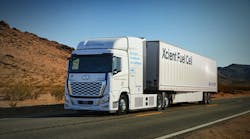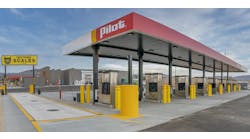Moving on from a one-fuel-fits-all scenario
More than ever information is developing around new powertrain advancements along with federal and state mandates for zero-emission vehicles. Will battery electric vehicles (BEVs) become the only fuel source for the future? Let’s look.
The first successful oil well was drilled in Cherry Township, Pennsylvania, on August 27, 1859, by Edwin Drake. It was only a few years later when a German scientist named Karl Benz was credited with the invention of the first petroleum (oil) powered vehicle. This is where our thirst for petroleum began, and what has been powering most vehicles across the world since.
The diesel engine is making fantastic progress in reducing pollutants per the 2027 emission standards. Not only are exhaust emissions being reduced, but fuel economy is increasing through these stringent regulations.
According to a statement by the government’s Office of Energy Efficiency & Renewable Energy, “Unlike other renewable energy sources, biomass can be converted directly into liquid fuels, called ‘biofuels,’ to help meet transportation fuel needs. The two most common types of biofuels in use today are ethanol and biodiesel, both of which represent the first generation of biofuel renewable technology.” It appears that many internal combustion engine (ICE) manufacturers are continuing ICE technology advancements for the future.
Let’s not forget about the evolutionary Cummins hydrogen engine and Toyota’s hydrogen engine which are both internal combustion engines fueled by hydrogen.
See also: The dawn of hydrogen trucks
Other vehicle manufacturers such as BMW, Porsche, China’s GAC, JCB construction equipment, and many others have hydrogen fueled internal combustion engines in production now.
Companies have too much at stake to scrap their production lines and jump into alternative powertrains. We saw this with the advent of the “automated” transmission. Utilizing technologies that a manufacturer has success with and aligning them to the future goals of a cleaner environment makes perfect business sense.
Showcasing how hydrogen production companies are partnering with trucking, Plug and Nikola plan to develop green hydrogen for both vehicle and commercial applications.
With Plug’s vision of the future of clean hydrogen energy production, aligning with Nikola’s vision of zero-emission vehicle (ZEV), the future of transportation is dramatically changing regarding fuels that are used for vehicle propulsion.
Nikola offers a battery electric semi-truck called the “TRE BEV,” and also the “TRE FCEV” which is a hydrogen fuel cell electric vehicle that will be available in 2023. Their partnership illustrates their commitment to green technology for the future.
Not committing to a single fuel source, but those that make the best geographical sense to impact a positive return on investment for the customer, makes for solid business choices. Freight needs to be moved 24/7 and companies need to be profitable for continued job growth, along with maintaining efforts for a clean planet.
And all these options mean that service organizations at fleet operations, dealerships, and even in the independent service channel, need to dramatically expand their thinking about the powertrains they will have to service in the future. While there will be some common componentry—think brakes and tires—there will be some unknowns and an extra concern for safety as technicians will be working with higher voltage than they are used to.
It is not too early for service organizations to begin making plans on how they are going to get proper training for their technicians and whether all techs will be trained on servicing every available option or if service providers will have technicians that specialize in one type of vehicle.
The industry is moving in the direction of multiple power sources and technicians need to be ready to help keep them on the road.
Ed Chipalowsky is vehicle service and support manager for the North American Council for Freight Efficiency (NACFE). In this role he will be reaching out to OEMs, fleets, vendors, and municipalities to learn about their challenges in not only developing curriculum for EV technicians but also how to recruit and develop future EV techs. Chipalowsky has an extensive background in trucking and education. He has more than 40 years’ experience as a technician manager and trainer including serving as a diesel technology instructor in both college and career and technical education high schools.



